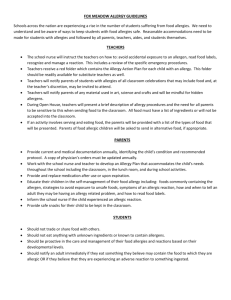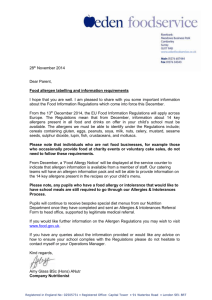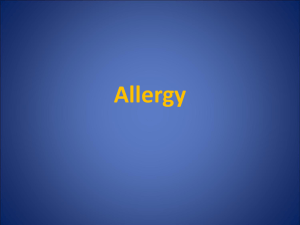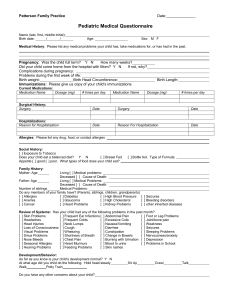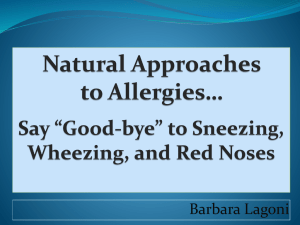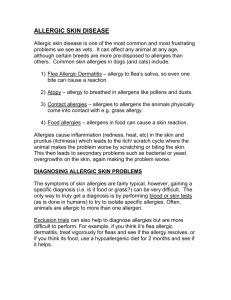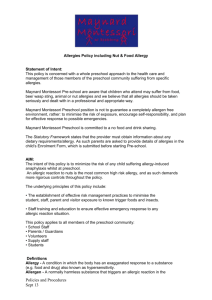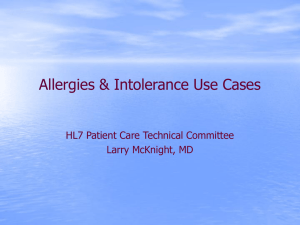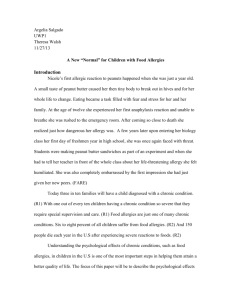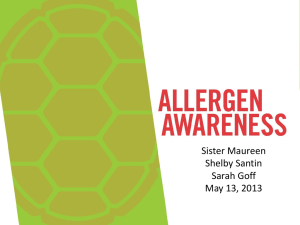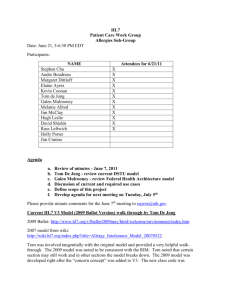What School Nurses Need to Know about Parents of Children with
advertisement
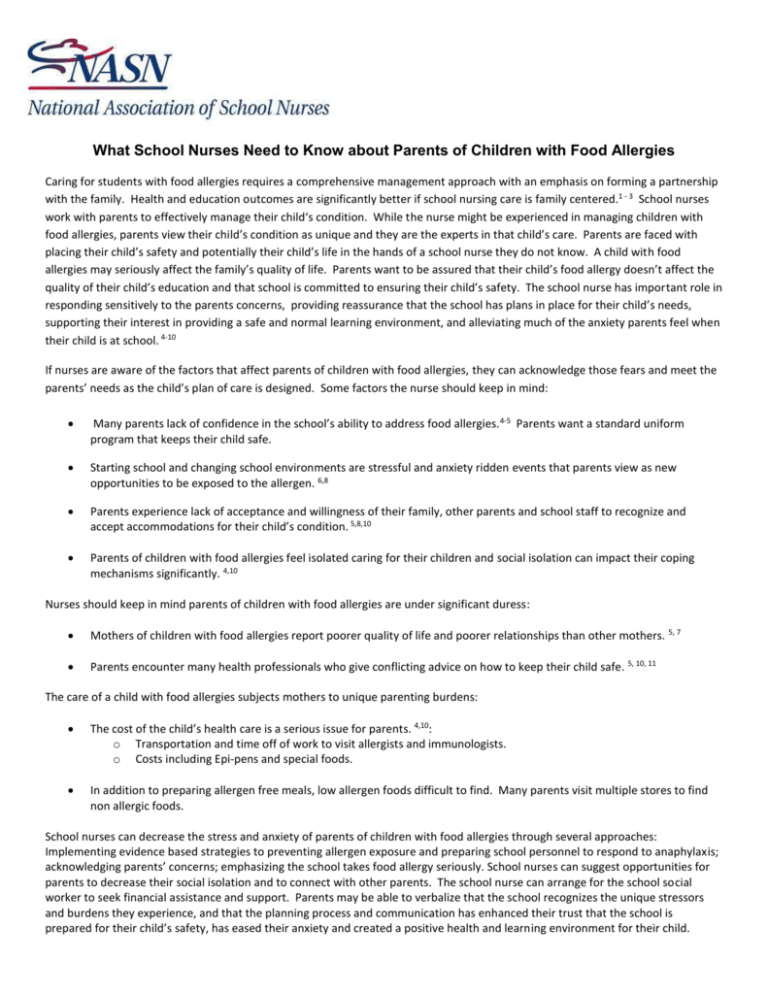
What School Nurses Need to Know about Parents of Children with Food Allergies Caring for students with food allergies requires a comprehensive management approach with an emphasis on forming a partnership with the family. Health and education outcomes are significantly better if school nursing care is family centered.1 - 3 School nurses work with parents to effectively manage their child‘s condition. While the nurse might be experienced in managing children with food allergies, parents view their child’s condition as unique and they are the experts in that child’s care. Parents are faced with placing their child’s safety and potentially their child’s life in the hands of a school nurse they do not know. A child with food allergies may seriously affect the family’s quality of life. Parents want to be assured that their child’s food allergy doesn’t affect the quality of their child’s education and that school is committed to ensuring their child’s safety. The school nurse has important role in responding sensitively to the parents concerns, providing reassurance that the school has plans in place for their child’s needs, supporting their interest in providing a safe and normal learning environment, and alleviating much of the anxiety parents feel when their child is at school. 4-10 If nurses are aware of the factors that affect parents of children with food allergies, they can acknowledge those fears and meet the parents’ needs as the child’s plan of care is designed. Some factors the nurse should keep in mind: Many parents lack of confidence in the school’s ability to address food allergies. 4-5 Parents want a standard uniform program that keeps their child safe. Starting school and changing school environments are stressful and anxiety ridden events that parents view as new opportunities to be exposed to the allergen. 6,8 Parents experience lack of acceptance and willingness of their family, other parents and school staff to recognize and accept accommodations for their child’s condition. 5,8,10 Parents of children with food allergies feel isolated caring for their children and social isolation can impact their coping mechanisms significantly. 4,10 Nurses should keep in mind parents of children with food allergies are under significant duress: Mothers of children with food allergies report poorer quality of life and poorer relationships than other mothers. 5, 7 Parents encounter many health professionals who give conflicting advice on how to keep their child safe. 5, 10, 11 The care of a child with food allergies subjects mothers to unique parenting burdens: The cost of the child’s health care is a serious issue for parents. 4,10: o Transportation and time off of work to visit allergists and immunologists. o Costs including Epi-pens and special foods. In addition to preparing allergen free meals, low allergen foods difficult to find. Many parents visit multiple stores to find non allergic foods. School nurses can decrease the stress and anxiety of parents of children with food allergies through several approaches: Implementing evidence based strategies to preventing allergen exposure and preparing school personnel to respond to anaphylaxis; acknowledging parents’ concerns; emphasizing the school takes food allergy seriously. School nurses can suggest opportunities for parents to decrease their social isolation and to connect with other parents. The school nurse can arrange for the school social worker to seek financial assistance and support. Parents may be able to verbalize that the school recognizes the unique stressors and burdens they experience, and that the planning process and communication has enhanced their trust that the school is prepared for their child’s safety, has eased their anxiety and created a positive health and learning environment for their child. 1. Bruce, B., Letourneau, N., Ritchie, J., Larocque, S., Dennis, C., & Elliott, M.R. (2002) A multisite study of health professionals’ perceptions and practices of family-centered care. Journal of Family Nursing 8:408–429. 2. Dearing, E.,Kreider, H., Simpkins, S., &Weiss, H. (2006). (2006) Family involvement in school and low-income children’s literacy: Longitudinal associations between and within families. Journal of Educational Psychology 98, 653–664 3. Denboba, D., McPherson, M.G., Kenney, M.K., Strickland, B. & Newacheck, P. (2006) Achieving family and provider partnerships for children with special health care needs. Pediatrics 118, 1607–1615. 4. Bollinger, M.E., Dahlquist, L.M., Mudd, K., Sonntag, C., Dillinger, L. & McKenna, K. (2006). The impact of food allergy on the daily activities of children and families. Annals of Allergy Asthma and Immunology, 96, 415–421. 5. Gupta, R.S., Springston, E.E., Smith, B., Kim, J.S., Pongracic, J.A., Wang, X., & Holl, J. (2010). Food allergy knowledge, attitudes, and beliefs of parents with food-allergic children in the United States. Pediatric Allergy & Immunology, 927-934. 6. Hu, W., Grbich, C. & Kemp, A. (2007). Parental food allergy information needs: A qualitative study. Archive of Disability in Childhood, 92, 71–77. 7. King, R.M., Knibb, R.C. & Hourihane, J.O. (2009). Impact of peanut allergy on quality of life, stress and anxiety in the family. Allergy, 64, 461-468. 8. Mandell, D., Curtis, R., Gold, M., & Hardie, S. (2005). Anaphylaxis: How do you live with it? Health and Social Work, 30, 325– 335. 9. Marklund, B., Ahlstedt, S., & Nordstrom, G. (2007). Food hypersensitivity and quality of life. Current opinion in Allergy and Clinical immunology, 7, 279–287. 10. McBride, C., McBride-Henry, K. & van Wissen, K. (2010). Parenting a child with medically diagnosed severe food allergies in New Zealand: The experience of being unsupported in keeping their children healthy and safe. Contemporary Nurse, 35, 77-87. 11. Hu, W., Grbich, C. & Kemp, A. (2008). When doctors disagree: A qualitative study of doctors and parents views on the risks of childhood food allergy. Health Expectations, 11, 208–219.
